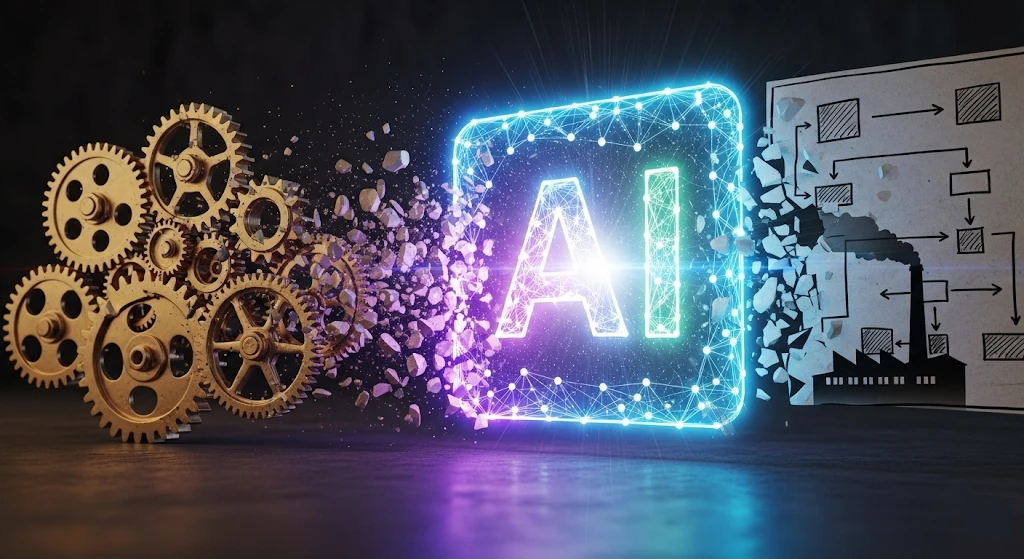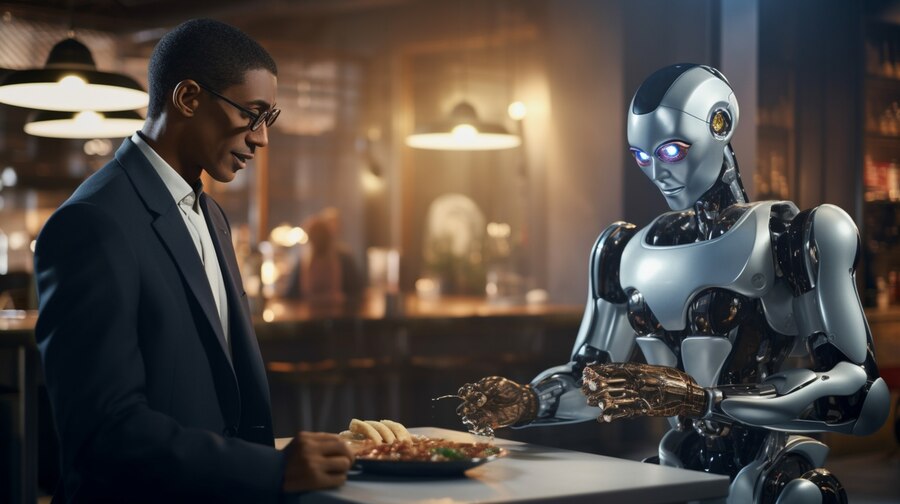
Artificial Intelligence (AI) is no longer a far-off concept or something reserved for science fiction novels. From manufacturing to healthcare, AI’s influence is sweeping across the globe, radically changing the way industries operate. This changing tide is poised to either sink or swim traditional business operating systems – time to gauge the fallout. Profound. With AI poking its head into nearly every industry, long-held business norms are crumbling, giving way to newer, sleeker approaches to core functions like customer service and R&D. Staying stagnant means betting on obsolescence – it’s a gamble no company can afford.
Something’s going on – what gives? Forget tinkering around the edges – AI is straight-up reinventing the way companies operate, sweeping aside old norms in the process. You can’t overstate the disruptor factor of this technology – it’s not just tinkering around the edges, but seriously rethinking how businesses are built from the ground up.

AI as a Catalyst for Innovation
Consider this: AI has injected businesses with a level of efficiency that was once unimaginable. A recent analysis by McKinsey points to a potential AI-driven economic surge of unprecedented proportions: $13 trillion by 2030, enough to forever alter the course of international trade and commerce. A stat that eye-popping simply cannot be dismissed. The moment AI takes over humdrum administrative tasks, the floodgates open for companies to pour their collective energy into innovation, guided by precision intelligence that illuminates their path forward.
For example, customer service, traditionally reliant on human agents answering queries, is being transformed by AI-powered chatbots. A report estimates that chatbots will save businesses more than $8 billion annually by 2024. These bots don’t just answer questions. They learn from every interaction, improving over time and anticipating customer needs before they’re even voiced. The result? A smoother, faster, and often more satisfying customer experience.
And that’s just one piece of the puzzle.
Automation and Operational Efficiency
Warehouses run by AI-driven robots are another example. On the frontline, machines are swiftly turning orders around, side-stepping potential mistakes that might trip up their human colleagues. Major players like Amazon and Walmart have discovered the magic of streamlining delivery times, zipping products to customers in a flash. Suddenly, the traditional model of warehousing—sluggish, human-intensive, mistake-prone—is no longer viable.
Take Netflix and Spotify, for instance – two powerhouses that show us how it’s done. Personalized content emerges when AI getooks into action, weaving together user preferences with just the right material. Recommendation guesses? Not on our watch. We dig deep into user behavior, tracking patterns and habits to inform our content strategy and produce stuff that truly resonates. In fact, 80% of Netflix viewer activity is driven by AI-powered recommendations.
The rise of AI in product development doesn’t just speed things up. The conventional corporate playbook is ripped to shreds as companies tune in to customer desires, iterating offerings on the fly to meet the evolving needs of their audience.
AI’s Influence on Product Development
AI is also disrupting the product development cycle. Historically, creating new products was a time-consuming and expensive process. It involved extensive market research, focus groups, and a lot of trial and error. But today, AI algorithms can sift through millions of data points to identify consumer trends and predict what products will succeed, all in a fraction of the time.
AI is everywhere these days, even where we don’t expect it. When you read novels online, it recommends novels for you based on your interests. When you read free novels online, you can also get an estimate of how much time you have left to read, “most frequently reread” features, and more. If you’re looking for free novels online, FictionMe is the perfect place to read iOS novels. There are thousands of novels online, and AI helps you find the right novels, for instance, on Fiction Me App. Similar AI principles can be found in Netflix and Spotify. These recommendations aren’t guesses—they’re the product of sophisticated algorithms analyzing user behavior, which in turn informs future content development. In fact, 80% of Netflix viewer activity is driven by AI-powered recommendations.
The rise of AI in product development doesn’t just speed things up. It changes the relationship between companies and consumers, moving businesses away from the traditional top-down approach of dictating what’s available to a more dynamic model where offerings are continuously adapted to meet shifting consumer desires.
Disrupting Marketing and Sales
Remember the days when marketing campaigns relied on broad strokes? Billboards, TV ads, cold calls? In the traditional model, marketers could only hope their message would reach the right audience at the right time.
Today, AI has changed the game entirely. Marketers now have the power to deliver hyper-personalized content to individual users, tailoring messages based on browsing history, previous purchases, and even social media activity. According to Gartner, companies that leverage AI in their marketing efforts are 15% more likely to grow their revenue year-over-year.
AI-driven algorithms track user engagement, adapt campaigns in real-time, and predict which leads are most likely to convert into customers. This is no longer the scattergun approach of traditional marketing; it’s precision-based and results-driven. It’s also making traditional sales roles, which once relied on instinct and personal relationships, increasingly obsolete.
Ethical Concerns: A Wrinkle in the AI Revolution
However, AI’s disruption isn’t all about smooth sailing and efficiency gains. As with any massive shift, there are ethical concerns—namely around privacy and job displacement. As AI technology hurdles forward, sifting through personal data like never before, the conversation around responsible data use can no longer be ignored.
As businesses hurry to inject AI into their systems, the EU’s tough data privacy rules, spelled out in the General Data Protection Regulation (GDPR), are throwing up major hurdles, forcing companies to rewrite their playbook. According to a 2023 report, over 45% of businesses still lack the capabilities to ensure AI compliance with data protection laws. The cost of non-compliance? Hefty fines and significant reputational damage.
Additionally, as AI automates more tasks traditionally done by humans, there’s growing concern about job displacement. Here’s a remarkable stat: a study by the World Economic Forum reveals that AI will likely slash 85 million jobs by 2025, but in the same timeframe, it’s expected to spawn an incredible 97 million fresh job openings. Workers in sectors where machines are taking over fastest will likely face the most disruption – that’s just the reality of the situation.
The Future: Adapt or Fade Away
In short, AI is more than just a buzzword or a fleeting trend. It’s the force that is reshaping business models across sectors. From automation in supply chains to personalized marketing, AI is making traditional methods look archaic and inefficient. Companies that embrace this shift and incorporate AI into their operations are not only surviving—they’re thriving. The ones that don’t? Well, they risk falling behind.
To conclude, we’re living in a time of unparalleled technological disruption. Traditional business models, once stable and secure, are being rapidly dismantled by AI. And while there are challenges ahead—ethical, logistical, and economic—the businesses that rise to meet them will be the ones that define the future.


